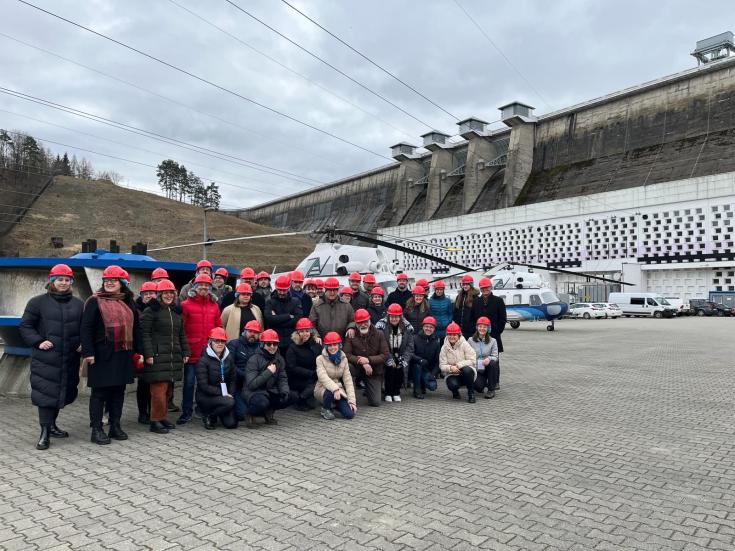SATSDIFACTION meets in Podkarpackie Region for its 2nd LDD

The Podkarpackie region organised successfully the 2nd Learning Deep Dive for the SATSDIFACTION project on February 13th and 14th, 2024, at the Podkarpackie Innovation Center in Rzeszów, Podkarpackie (Poland). The region prepared a comprehensive agenda aimed at exploring the potential of using satellite data to advance renewable energy sources. The opening session, led by distinguished figures including Władysław Ortyl, Marshal of the Podkarpackie Region and NEREUS Vice-President, Michał Pilecki, Director of the Regional Office of the Polish Space Agency in Rzeszów, Professor Andrzej Majka - Ignacy Łukasiewicz Rzeszów University of Technology, and Michał Tabisz - Podkarpackie Innovation Center underscored the significance of regional collaboration in harnessing space technologies for sustainable development. In particular, Marshal Władysław Ortyl emphasized that such initiatives of using satellite data enhance economy, social development, and capacity building skills.
Next, the region arranged a press briefing featuring the speakers, during which Mirko Mazzarolo, the project coordinator, explained the objectives of SATSDIFACTION and the role of Podkarpackie to improve its policy instrument regarding their climate strategy by integrating satellite data. Margarita Chrysaki from NEREUS (Network of European Regions Using Space Technologies) pointed out that projects, such as SATSDIFACTION initiated in the NEREUS platform contribute significantly to the growth and development of regions.
This first day's programme delved into 2 key learning deep dive sessions. The first session examined the potential of the Podkarpackie Region in unmanned systems and space technology clusters, while the second session focuses on tools, needs, and experiences related to national satellite information systems and the practical application of spatial information systems. Notable speakers from various sectors, including academia, government agencies, and regional development bodies, shared insights and best practices, and discussed topics including the use of satellite data, drone data and artificial intelligence in public administration. The session concluded with discussions on the use of renewable energy sources in the region, emphasizing climate strategies and the role of remote sensing data in driving sustainable energy initiatives.
Following the end of the sessions, the second in-person Steering Committee of the Project convened, focusing on various critical aspects. The report provided an overview of the meeting discussions and the decisions made by the members. Financial management and reporting were addressed. Communication and dissemination activities proceeded according to plan. Details about upcoming events, including the third Learning Deep Dive hosted by Azores, and participation in Interreg Europe events, were also outlined.
In the framework of study visits, the hosting region arranged a tour of the Rzeszow Cellars and a dinner, providing participants with valuable networking opportunities and a deeper understanding of regional initiatives in cultural heritage, innovation and sustainability.
The second day, the learning deep dive facilitated robust discussions with experts on cutting-edge and practical applications in public administration procedures topics, such as the role of space technologies in modern agriculture and the integration of spatial information infrastructure for effective management. In this respect, a study tour of the hydroelectric power plant in Solina, located in the Bieszczady region, showcased to participants the inner workings of the hydroelectric power plant, highlighting its role as a prime example of utilizing renewable energy sources within the Podkarpackie Region. Marta Milczarek from the Space Research Center of the Polish Academy of Sciences discussed the application of remote sensing technology in monitoring ice accumulation on the San River. Following the tour, project partners experienced a gondola railroad ride spanning 1540 meters over the Solina dam, culminating in a climb to an observation tower. Next, they undertook a study visit to a wind farm near Rymanow, presenting another aspect of renewable energy usage in the region. During the visit, Mr. Wojciech Farbaniec, the mayor of the Rymanow Community, extended a warm welcome to the partners to the final networking dinner.
With the support of local and regional politicians during the 2nd learning deep dive, the visibility of the project and its activities has been tremendously increased. In addition, many stakeholders came to Poland and took part to these activities. Using satellite data to develop renewable energy in the Podkarpackie Region and improve decision-making marks a major step forward in regional development. With support from the INTERREG program, partners are poised to revolutionize how technology drives progress in the region.